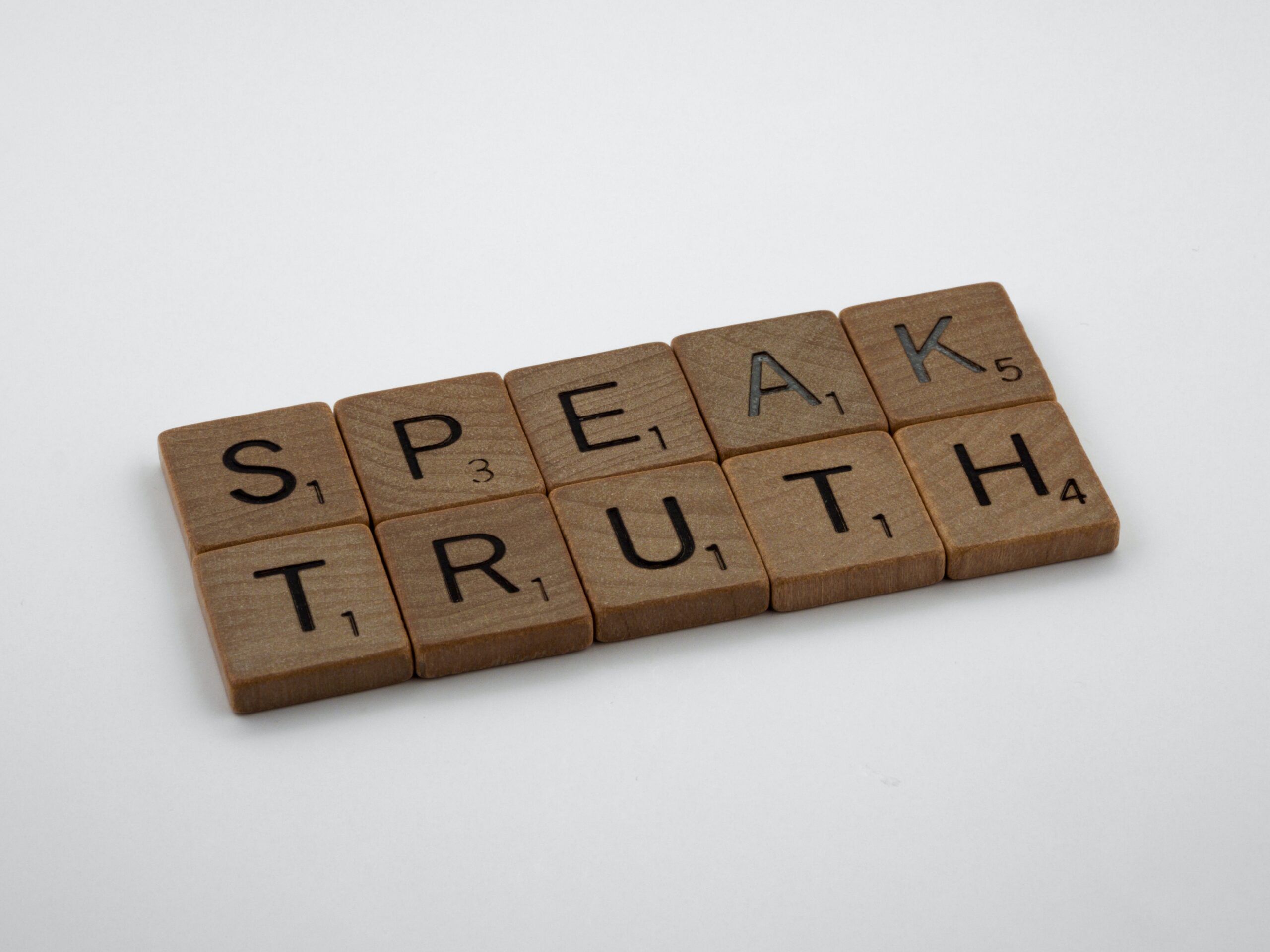Honesty is hard. Honesty with other people is hard – but sometimes honesty with ourselves is even harder. On the one hand, it’s just us! We’ve seen it all – so what’s the big deal? On the other, sometimes it’s just easier to bury the truth, swallow a lie, live in denial, rather than face up to the reality of ourselves.
Here are some reasons why it might be difficult for you to be honest with yourself.
||ONE|| The honest answer doesn’t match the “should”.
(A) There are two ways this can go. First, I can refuse to be honest with myself because I know my honesty doesn’t match what I should or ought to want or do.
Let’s say I’m really, really angry at someone who has hurt me, and I want to punch them in the face. I know I shouldn’t punch them in the face, so instead of acknowledging my anger, I just bury it deep. I say “it’s fine.”
This is the case of a “good should” – the kind of shoulds that stop us harming ourselves and other people.
But the problem is, we can’t magically change ourselves into the kind of person who always wants to do the good should. The only way we get there is to acknowledge the gap between us and it: “I know I should want to be kind to her, but right now, I don’t want to. I want to punch her.”
That acknowledgement, that naming, gives us power over the feeling. We can see it for what it is: a very strong emotional response. If we hide it from ourselves, we give it all the power: it becomes something welling up in us, getting stronger and stronger until it bursts.
(B) Sometimes, however, we carry around “shoulds” that are false.
It’s true we shouldn’t punch people out of anger. But what about shoulds like, “I should enjoy practicing the piano,” or, “I should be the kind of person who loves poetry”? Those are shoulds that are subjective, and can be false for us.
What if I spent years of my life practicing the piano simply because I believe I should? Not because I enjoy it, or because I’m good at it, or because I want to be a pianist. Somewhere along the way in my life, I began to assume that I should do it, and so I do. It’s going to get more and more difficult for me to be honest about my not liking it, if I think I should.
This kind of dishonesty with self can come from a fear of displeasing someone else, known or unknown. But if it’s not an objectively good should, then why does it have power over me? Honesty helps me to examine the true nature of the “should” I subject myself to.
(NB: “practicing the piano” is different from “trying to grow in the virtue of perseverance” – sometimes the piano can be an occasion for it, but sometimes it isn’t.)
||TWO|| The honest answer is uncomfortable
(A) Sometimes being honest with myself requires something difficult for me. It makes me uncomfortable because I might have to face the fact that I’m living in a way that doesn’t align with what I truly believe. If I admit the truth to myself, I might need to change my actions or life in some way, and that’s just too much to handle, so I suppress the truth in myself.
Let’s say, for example, that I know and believe stealing is wrong. But downloading pirated films off the internet is so convenient! And so much cheaper than having to purchase or rent them. So instead of acknowledging that what I’m doing is stealing, I come up with all sorts of reasons why it isn’t really stealing: “those big corporations make so much money, anyway, and Hollywood is corrupt, and they should make it more difficult if they really don’t want people to do it. It’s not like I’m taking something from a small business owner.”
The truth is, being honest with myself about what I’m doing requires a change in my life, and one that I don’t want to make. So instead, I just lie to myself about what I am doing.
(B) Other times, the honest answer brings me grief. If I’m honest with myself, I might have to admit that I’m doing something fruitless, or that I desire something that’s unattainable or unlikely to happen.
Perhaps what I really want, above all else, is something that doesn’t depend very much on me – for someone else to return my love, for a family member to be healed of terminal illness, for a positive pregnancy test.
But because those things seem (or are) so impossible, I just can’t honestly acknowledge my desire for them: it’s too painful.
If I were honest about my desire, I’d have to face the fact that I want something I’m unlikely to get, and that hurts too much. So instead, I tell myself that I’m fine without it, perhaps even happy or at least fulfilled so much in other areas of my life, that I don’t need to want anything else. So I don’t.
The problem with that kind of dishonesty is that the pain doesn’t go away just because we refuse to acknowledge it. Instead, it just sits in us, growing heavier and heavier while we refuse to release it by naming it. We’re afraid of grief, but grieving brings freedom from the weight of what is buried.
||THREE|| We can’t sort out the superficial from the profound
Sometimes, there’s a very simple reason we struggle to be honest with ourselves: we can’t figure out what’s actually important. How many of us have gotten into an argument with another person, claiming that we were honestly upset about something, only to realize later that actually, honestly, we were just hungry? (“Hangry”!)
Things like sleep deprivation, low blood sugar, weak dopamine receptors, and fluctuating hormones all interfere with our ability to really know ourselves, because they act like mirrors in a fun house, distorting our self-image, exaggerating all the wrong parts, and making us think we’re disproportionately sized.
Keeping some sort of record of our bodily reactions, health, and wellness can help us to see patterns in our behaviours or beliefs that might be linked to physical conditions.
||FOUR|| The primary voice we listen to doesn’t speak the truth in love
It’s hard to be honest with yourself when all you do is get knocked down for it. If you’ve finally worked up the courage to speak the truth to yourself, and the immediate response from the voice in your head is negative, where is the incentive to be honest again? If you’re honest and get punished for it, it’s not going to be easy to keep going.
Try sorting out both the tone and content of the influential voices – yours and others.
Is there a negative voice of good should? “What a terrible thing to think about someone else! You’re a horrible person! It’s no wonder you have no friends.”
Is there a negative voice of false should? “You’re so ungrateful! There are deprived children everywhere who would love to be able to take piano lessons! Only a spoiled and lazy child wouldn’t enjoy practicing!”
Is there a negative voice of discomfort? “Paying for movies is stupid! Only suckers do that. Your bank account would run out so quickly you’d be living on pasta for weeks.”
Or a negative voice of fear? “No one is ever going to love you. You’re never going to get married because you aren’t good enough, so just stop. You have a successful career and you don’t need anything else. You’re proving to the world that you’re strong and independent and it just doesn’t matter if marriage ever happens.”
Maybe your negative inner voice is urged on by a physical issue. “Why doesn’t she hurry up! I’m so hungry and this queue is so slow! I could just punch her in the face for chatting instead of moving along. Oh, there I am, being a horrible, impatient person again. I’m such a mean person.”
Can you see what the negative voice does? It takes a tiny truth and spins it all out of proportion, so that if you try to be honest, you end up feeling horrible.
Truth: Having mean thoughts about someone else is not a good thing.
Falsehood: You’re a horrible person with no friends because of it.
Truth: There are children somewhere who would like to have piano lessons but can’t.
Falsehood: Just because you don’t like the piano, you’re ungrateful.
Truth: Your bank account would need adjusting if you started paying to watch movies honestly.
Falsehood: Paying for movies is stupid.
Truth: You do have a successful career that brings you happiness.
Falsehood: You don’t need anything else in your life.
Truth and love are two sides of the same coin. The voices that call us to be honest will speak the truth in love. If the influential voices in your life are false and mean, it’s time to ask God, who is Truth and Love, to speak louder. Give Him time so you can learn to listen well.






